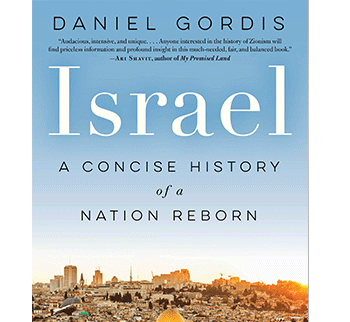In September, Mahmoud Abbas, president of the Palestinian Authority, ascended the podium at the General Assembly of the United Nations and demanded that Great Britain apologize for the Balfour Declaration of 1917.
Abbas had already instructed a legal team some months earlier to prepare a lawsuit against the British government for damages caused by the publication of the declaration some 100 years earlier.
That Abbas’ pronouncement was further evidence of the Palestinian leadership’s unchanging, implacable rejection, over all these years, of a sovereign Jewish presence in the historic land of Israel, is painful and sad for the advocates and seekers of peaceful co-existence between the two peoples.
But that it was also entirely a construct of falsehood and lies which went essentially unchallenged, and in fact was applauded by so many, is compelling proof of the urgent need for a concise, accurate historical record of the creation of the State of Israel that enables one to respond truthfully to Abbas’ many deceits.
It is therefore cause for celebration by those who seethe at the unfair treatment of Israel that Ecco/HarperCollins has recently published such a work. Israel: A Concise History of a Nation Reborn will also be well received by those individuals who wish, simply, to learn the facts about Israel’s history and present day circumstance.
Aimed at the reader with minimal starting knowledge, the book provides a chronological, panoramic timeline of Israel, starting from Theodore Herzl’s bold, epochal intervention in world affairs at the beginning of the last century to the complex and complicated reality of the country today. But Daniel Gordis presents Israel’s story in a vastly more satisfying and enlightening manner than a one-dimensional linear narrative.
Gordis’ aim is more than the mere registry of key events in the life of the country. He examines why such events happened and their impact on the evolving democratic, cultural, social and civic ethos of the country.
To that end, for example, he frequently points to the poetry, song, literature and films of renowned cultural icons to depict the popular spirit of the time. He brings the reader more than a historical perspective upon critical national junctures. He brings us the introspections and celebrations, the anxieties and deep searching of the collective societal soul. Whether through popular literary and artistic works, aggressive media challenge, or officious institutional commissions of inquiry, Gordis notes that “self-critique would be one of the most defining characteristics of Israeli society.” Indeed, he underlines with pointed clarity that the achievements of the people of Israel are so very remarkable because of their harsh, painful self-examination despite the unceasing hostility of surrounding sworn enemies.
Gordis does not shirk from exposing the flaws and failures of Israeli policy even as he attempts to explain why the policies may have been enacted in the first place. Nor does he avoid casting harsh light on events or people when warranted. But he gives context and broad historical focus – not excuses or justifications – for the failures.
It is those failures, or purported failures, or brazen falsehoods passed off as failures, that have been exploited by Israel’s enemies.
As Gordis points out, since 1975 these enemies have waged a war not only to delegitimize the State of Israel as a nation among all nations, but to cast as legally odious ab initio the very idea of a sovereign Jewish nation.
The United Nations, he adds, is ground zero for this battle. Like Abbas at the podium of the General Assembly, Israel’s obsessive, single-minded detractors spread calumny after calumny about the Jewish state.
READ: ISRAEL SUSPENDS TIES WITH UNESCO
But what pains Gordis deeply is that so many American Jews, many college-age, have been conscripted – or worse, volunteer – in the propaganda campaign against the Jewish state. Offended by the policies of Israel’s right-wing government, many left-wing and liberal American Jews now vociferously reject the country. Many have been swept onto the anti-Israel campaign by their need to stand alongside the downtrodden and the oppressed. But with their lack of elementary knowledge of the subject, they cannot see past simplistic images, nor hear past the rhetoric.
This worrisome development among the young Jews in the land of his birth prompted Gordis to write the book. He explained his motivation in an essay last April in Mosaic.
“I undertook this project precisely because it was evident to me that as long as American Jews knew little of how and why Zionism developed, and what Israel as a political, social, and civilizational enterprise has become and stands for, every conversation about the Jewish state would be overshadowed by the ongoing 85-year-old conflict with the Palestinians – an admittedly central topic that, however, cannot be intelligently approached without a grasp of the larger and infinitely more clarifying picture.”
READ: ISRAEL BOYCOTT MOTIVATED BY HATE
Gordis is eminently qualified for the task of bringing information and knowledge about the origins of Israel to those who seek it. He is a much published author and the senior vice-president and Koret Distinguished Fellow at Shalem College in Jerusalem.
Israel: A Concise History of a Nation Reborn is crisply written, always informative, often inspiring and deeply researched, with more than a hundred pages of notes and annotations. Even those with a deep and long attachment to the Zionist idea will find more to learn here. Each one of us, no matter our background, has much to gain from this valuable resource.
